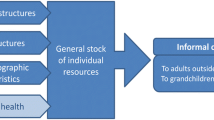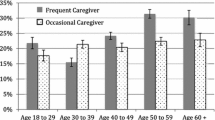Abstract
Informal caregivers are those who provide care for others without compensation. In the US, 85 % of elderly individuals receive care from an informal caregiver, and this number is expected to increase. Caregivers often experience different types of strain, stemming from physical, emotional, and financial demands. Guided by intersectionality theory, this study explores the relationships between informal caregiving strains and gender, race, and income, along with various control variables, including age, marital status, education, number of hours spent providing care, and employment status. Data from the 2015 Caregiving in the US survey (N = 1248) were used. Findings indicated male informal caregivers reported more financial strain compared to females. White women reported more emotional strain than women of color, and those with higher incomes reported less financial strain. Gender, race, and income were not significantly related to physical strain among informal caregivers. Implications, limitations, and suggestions for future research are discussed.
Similar content being viewed by others
References
Badana, A. N. S., Marino, V., & Haley, W. E. (2017). Racial differences in caregiving: Variations by relationship type and dementia care status. Journal of Aging and Health, 29, 1–22.
Barker, J. C., Morrow, J., & Mitteness, L. S. (1998). Gender, informal social support networks, and elderly urban African Americans. Journal of Aging Studies, 12(2), 199–222.
Bookman, A., & Kimbrel, D. (2011). Families and elder care in the twenty-first century. The Future of Children, 21(2), 1–23.
Bullock, K., Crawford, S. L., & Tennstedt, S. L. (2003). Employment and caregiving: Exploration of African American caregivers. Social Work, 48(2), 150–162.
Chappell, N. L., & Funk, L. M. (2011). Social support, caregiving, and aging. Canadian Journal of Aging, 30(3), 355–370.
Chappell, N. L., & Hollander, M. (2013). Aging in Canada. Toronto: Oxford University Press.
Chappell, N. L., Dujela, C., & Smith, A. (2015). Caregiver well-being: Intersections of relationship and gender. Research on Aging, 37(6), 623–645.
Cho, S., Crenshaw, K. W., & McCall, L. (2013). Toward a field of intersectionality studies: Theory, applications, and practice. Journal of Women in Culture and Society, 38(4), 785–810.
Cohen, S., & Janicki-Deverts, D. (2012). Who’s stressed? Distributions of psychological stress in the United States in probability samples from 1983, 2006, and 2009. Journal of Applied Social Psychology, 42(6), 1320–1334.
Cohen, S.A., Sabik N.J., Cook, S.K., Azzoli, A.B., & Mendez-Luck, C.A. (2019). Differences within differences: Gender inequalities in caregiving intensity vary by race and ethnicity in informal caregivers. Journal of Cross-Cultural Gereontology, 34(3), 245-263.
Collins, P. H. (2015). Intersectionality’s definitional dilemmas. Annual Review of Sociology, 41, 1–20.
Cook, S. K., & Cohen, S. A. (2018). Sociodemographic disparities in adult child informal caregiving intensity in the United States: Results from the new National Study of caregiving. Journal of Gerontological Nursing, 44, 15–20.
Cook, S. K., Snellings, L., & Cohen, S. A. (2018). Socioeconomic and demographic factors modify observed relationship between caregiving intensity and three dimensions of quality of life in informal adult children caregivers. Health and Quality of Life Outcomes, 16, 2–12.
Darragh, A. R., Sommerich, C. M., Lavender, S. A., Tanner, K. J., Vogel, K., & Campo, M. (2015). Musculoskeletal discomfort, physical demand, and caregiving activities in informal caregivers. Journal of Applied Gerontology, 34(6), 734–760.
Do, E. K., Cohen, S. A., & Brown, M. J. (2014). Socioeconomic and demographic factors modify the association between informal caregiving and health in the sandwich generation. BMC Public Health, 14, 362–382.
Douglas, S. L., Daly, B. J., O’Toole, E., & Hickman, R. L. (2010). Depression among white and nonwhite caregivers of the chronically critically ill. Journal of Critical Care, 25, 364.e11–364.e19.
Ejem, D., Bauldry, S., Bakitas, M., & Drentea, P. (2018). Caregiver burden, care recipient depressive symptomology, and social exchange: Does race matter? Journal of Palliative Care, 33, 100–108.
Elmelech, Y., & Lu, H. H. (2004). Race, ethnicity, and the gender poverty gap. Social Science Research, 33, 158–182.
Evans, G. W., Wethington, E., Coleman, M., Worms, M., & Frongillo, E. A. (2008). Health inequalities among older persons: The mediating role of multiple risk exposures. Journal of Aging and Health, 20, 107–125.
Family Caregiver Alliance. (2017). Caregiving. Retrieved from: http://www.caregiving.org/caregiving2015/.
Frederick, D. (2018). Mitigating burden associated with informal caregiving. Journal of Patient Experiences, 5(1), 50–55.
Gouin, J. P., Estrela, C., Desmarais, K., & Barker, E. T. (2016). The impact of formal and informal social support on health in context of caregiving stress. Family Relations, 65(1), 191–206.
Henz, U. (2006). Informal caregiving at working age: Effects of job characteristics and family configuration. Journal of Marriage and Family, 68, 411–429.
Hillier-Parks, S., & Pilisuk, M. (1991). Caregiver burden: Gender and the psychological costs of caregiving. American Journal of Orthopsychiatry, 61(4), 501–509.
Hong, M., & Casado, B. (2015). Caregiver stress: Does states' expenditure on home- and community-based services matter? Home Health Care Services Quarterly, 34(2), 85–100.
Karlin, N. J., Weil, J., & Gould, J. (2012). Comparisons between Hispanic and non-Hispanic White informal caregivers. SAGE Open, 2(4), 1–10.
Kazhungil, F., Velayudhan, R., Kumar, M., & Thazhe Mangool, R. (2016). A comparative study of caregiver burden in late-onset depression and Alzheimer's disease. Psychogeriatrics, 16, 209–215.
Kirby, J. B., & Lau, D. T. (2010). Community and individual race/ethnicity and home health care use among elderly persons in the United States. Health Services Research, 45(5), 1251–1267.
Kneipp, S. M., Castleman, J. B., & Gailor, N. (2004). Informal caregiving burden: An overlooked aspect of the lives and health of women transitioning from welfare to employment. Public Health Nursing, 21(1), 24–31.
Krekula, C. (2007). The intersection of age and gender: Reworking gender theory and social gerontology. Current Sociology, 55(2), 155–171.
Lee, Y., & Zurlo, K. A. (2014). Spousal caregiving and financial strain among middle-aged and older adults. The International Journal of Aging and Human Development, 79(4), 263–278.
Lee, Y., Tang, F., Kim, K. H., & Albert, S. M. (2015). The vicious cycle of parenting caregiving and financial well-being: A longitudinal study of women. The Journals of Gerontology: Series B, 70(3), 425–431.
Lin, I. F., Fee, H. R., & Wu, H. S. (2012). Negative and positive caregiving experiences: A closer look at the intersection of gender and relationship. Family Relations, 61, 343–358.
Litzelman, K., Skinner, H. G., Gangnon, R. E., Nieto, F. J., Malecki, K., & Witt, W. P. (2015). The relationship among caregiver characteristics, caregiver strain, and health-related quality of life: Evidence from the survey of health of Wisconsin. Quality of Life Research, 24(6), 1397–1406.
Martin, C. D. (2000). More than work: Race and gender differences in caregiving burden. Journal of Family Issues, 21(8), 986–1005.
Mayo Clinic. (2018). Caregiver Stress: Tips for Taking Care of Yourself. Retrieved from: https://www.mayoclinic.org/healthy-lifestyle/stress-management/in-depth/caregiver-stress/art-20044784.
Mier, N. (2007). The caregiving experience among Hispanic caregivers of dementia patients. Journal of Cultural Diversity, 14(1), 12–18.
Miyawaki, A., Tanaka, A., Kobayashi, Y., & Kawachi, I. (2019). Informal caregiving and mortality―who is protected and who is not? A prospective cohort study from Japan. Social Science and Medicine, 223, 24–30.
Molloy, G. J., Johnston, D. W., Johnston, M., Morrison, V., Pollard, B., Bonetti, D., & MacWalter, R. (2005). Extending the demand-control model to informal caregiving. Journal of Psychosomatic Research, 58(3), 243–251.
Morgan, T., Williams, L. A., Trussardi, G., & Gott, M. (2016). Gender and family caregiving at the end-of-life in the context of old age: A systematic review. Palliative Medicine, 30(7), 616–624.
NAC & AARP Public Policy Institute. (2015). Caregiving in the U.S. 2015. Retrieved from:http://www.caregiving.org/wpcontent/uploads/2015/05/2015_Caregivinginth eUS_Executive-Summary-June-4_WEB.pdf
Namkung, E. H., Greenberg, J. S., & Mailick, M. R. (2015). Well-being of sibling caregivers: Effects of kinship relationship and race. The Gerontologist, 57(4), 626–636.
National Alliance for Caregiving. (2015). Caregiving in the U.S. 2015. Retrieved from: http://www.caregiving.org/caregiving2015/.
National Alliance for Caregiving & Evercare. (2007). Family caregivers—what they spend, what they sacrifice: The personal financial toll of caring for a loved one. Retrieved from: http://www.caregiving.org/pdf/research/Evercare_NAC_CaregiverCostStudyFINAL20111907.pdf
Navaie-Waliser, M., Feldman, P. H., Gould, D. A., Levine, C., Kuerbis, A. N., & Donelan, K. (2001). The experiences and challenges of informal caregivers: Common themes and differences among whites, blacks, and Hispanics. The Gerontologist, 41(6), 733–741.
Navaie-Waliser, M., Spriggs, A., & Feldman, P. H. (2002). Informal caregiving: Differential experiences by gender. Medical Care, 40(12), 1249–1259.
Pavalko, E. K., & Artis, J. E. (1997). Women’s caregiving and paid work: Causal relationships in late midlife. Journal of Gerontology: Social Sciences, 52B(4), 170–S179.
Perkins, M., Howard, V. J., Wadley, V. G., Crowe, M., Safford, M. M., Haley, W. E., & Roth, D. L. (2013). Caregiving strain and all-cause mortality: Evidence from the REGARDS study. The Journal of Gerontology: Series B, 68(4), 504–512.
Pillemer, S., & Davis, J. (2018). Gender effects on components of burden and depression among dementia caregivers. Aging and Mental Health, 22, 1156–1161.
Pinquart, M., & Sorensen, S. (2005). Ethnic differences in stressors, resources, and psychological outcomes of family caregiving: A meta-analysis. The Gerontologist, 45(1), 90–106.
Pinquart, M., & Sorensen, S. (2006). Gender differences in caregiver stressors, social resources, and health: An updated meta-analysis. The Journals of Gerontology: Series B, 61(1), 33–45.
Roth, D. L., Perkins, M., Wadley, V. G., Temple, E. M., & Haley, W. E. (2009). Family caregiving and emotional strain: Associations with quality of life in a large national sample of middle-aged and older adults. Quality of Life Research, 18(6), 679–688.
Rubin, R. M., & White-Means, S. (2009). Informal caregiving: Dilemmas of sandwiched caregivers. Journal of Family and Economic Issues, 30(3), 252–267.
Schrank, B., Ebert-Vogel, A., Amering, M., Masel, E. K., Neubauer, M., Watzke, H., & Schur, S. (2015). Gender differences in caregiver burden and its determinants in family members of terminally ill cancer patients. Psycho-Oncology, 25, 808–814.
Schwarz, K. A., & Roberts, B. L. (2000). Social support and strain of family caregivers of older adults. Holistic Nursing Practice, 14(2), 77–90.
Siefert, M. L., Williams, A., Dowd, M. F., Chappel-Aiken, L., & McCorkle, R. (2008). The caregiving experience in a racially diverse sample of cancer family caregivers. Cancer Nursing, 31, 399–407.
Skarupski, K. A., McCann, J. J., Bienias, J. L., & Evans, D. A. (2009). Race differences in emotional adaptation of family caregivers. Aging & Mental Health, 13(5), 715–724.
Tsai, Y.-H., Lou, M.-F., Feng, T.-H., Chu, T.-L., Chen, Y.-S., & Liu, H.-E. (2018). Mediating effects of burden on quality of life for caregivers of first-time stroke patients discharged from the hospital within one year. BMC Neurology, 18, 1–9.
Viruell-Fuentes, E. A., Miranda, P. Y., & Abdulrahim, S. (2012). More than culture: Structural racism, intersectionality theory, and immigrant health. Social Science & Medicine, 75(12), 2099–2106.
Walker, A. J., Pratt, C. C., & Eddy, L. (1995). Informal caregiving to aging family members: A critical review. Family Relations, 44(4), 402–411.
Wright, L. K., Hickey, J. V., Buckwalter, K. C., Hendrix, S. A., & Kelechi, T. (1999). Emotional and physical health of spouse caregivers of persons with Alzheimer’s disease and stroke. Journal of Advanced Nursing, 30, 552–563.
Yee, J. L., & Schulz, R. (2000). Gender differences in psychiatric morbidity among family caregivers: A review and analysis. The Gerontologist, 40(2), 147–164.
Author information
Authors and Affiliations
Corresponding author
Ethics declarations
Conflict of Interest
This manuscript in part or full has not been submitted or published anywhere else. This manuscript will not be submitted to any other journals until the editorial process is complete. No potential conflict of interest is reported by the authors. Ethical procedures were followed for this study, including obtaining IRB approval for the study.
Additional information
Publisher’s Note
Springer Nature remains neutral with regard to jurisdictional claims in published maps and institutional affiliations.
Rights and permissions
About this article
Cite this article
Willert, B., Minnotte, K.L. Informal Caregiving and Strains: Exploring the Impacts of Gender, Race, and Income. Applied Research Quality Life 16, 943–964 (2021). https://doi.org/10.1007/s11482-019-09786-1
Received:
Accepted:
Published:
Issue Date:
DOI: https://doi.org/10.1007/s11482-019-09786-1




